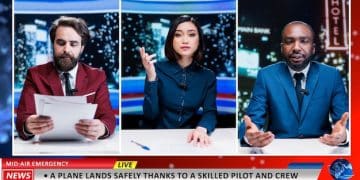Social Media’s Impact on US Politics: A Cultural Analysis

The Impact of Social Media on US Political Discourse: A Cultural Analysis reveals how platforms like Facebook and Twitter have reshaped political engagement, influencing election outcomes, public opinion, and the very nature of democratic debate in the United States.
Social media has fundamentally transformed how political discourse unfolds in the United States. This cultural analysis explores the Impact of Social Media on US Political Discourse: A Cultural Analysis by exploring its multifaceted implications on American politics.
The Rise of Social Media in American Politics
Social media platforms have become indispensable tools for political campaigns, advocacy groups, and individual citizens alike. Understanding how these platforms have reshaped the political landscape is crucial.
The Early Days of Political Social Media
Initially, social media was seen as a novel way to engage younger voters. Today, it’s a primary battleground for political influence.
From Campaigning to Governing
Social media’s role has evolved from just campaigning to shaping policy debates and influencing public sentiment during governance.
- Direct engagement with constituents bypassing traditional media.
- Rapid dissemination of information (and misinformation).
- The creation of echo chambers and filter bubbles.
The pervasive nature of social media has redefined political marketing. No longer is it enough to place an ad on television, political operators must cultivate an image online and deal with the challenges that come with the immediacy of social networks.

The Spread of Misinformation and “Fake News”
One of the most concerning aspects of social media’s influence on US political discourse is the rapid spread of misinformation.
The Role of Algorithms
Algorithms designed to maximize engagement often prioritize sensational or emotionally charged content, regardless of its veracity.
The Impact on Public Trust
Constant exposure to misinformation can erode public trust in institutions and traditional media outlets.
- The creation and dissemination of “fake news” articles.
- The use of bots and automated accounts to amplify false narratives.
- The challenge of fact-checking in real-time.
While social media platforms have promised to curb the spread of misinformation, many observers remark that more can be done to control narratives and help provide individuals with the truth.
Polarization and Echo Chambers
Social media has been accused of exacerbating political polarization by creating echo chambers where individuals are primarily exposed to information that confirms their existing beliefs.
The Algorithm Effect
Social media algorithms contribute to polarization by curating content based on user preferences, reinforcing existing viewpoints.
Online Group Dynamics
The anonymity and lack of face-to-face interaction online can lead to more extreme expressions of political views.
Social media can create polarization. Here are some effects:
- Increased animosity between different political groups.
- Reduced willingness to engage in civil discourse.
- Reinforcement of extreme ideologies.
As the country becomes more divided on social media, some say that the platforms are only mirroring the divide that exists in the real world, rather than being the cause of it. However, most point to the way content is shared and engaged with to note the particular dangers of social media in a civic context.

Social Media’s Influence on Elections
Social media has become a critical battleground for political campaigns, with candidates using platforms to mobilize voters, disseminate messages, and attack opponents.
Campaigning in the Digital Age
Social media allows campaigns to target specific demographics with personalized messages, increasing their effectiveness.
Mobilizing Voters
Social media can be used to encourage voter registration, provide information about polling locations, and get out the vote on Election Day.
Social media has changed election cycles in many ways. Consider the following:
- The spread of disinformation to discourage voting.
- Micro-targeting voters with political ads.
- Influencing voter turnout through social pressure.
As social media has rapidly grown, it has become a major source for political news. Election discourse online has become part of mainstream political activity.
Activism and Social Movements
Social media has also played a crucial role in facilitating activism and social movements, allowing individuals to organize, mobilize, and raise awareness about political issues.
The Power of Hashtags
Hashtags have become a powerful tool for organizing and amplifying social and political movements.
Grassroots Organizing
Social media enables grassroots activists to connect with like-minded individuals, share information, and coordinate actions.
Some examples of activism and social movements include:
- Organizing protests and demonstrations.
- Raising awareness about social and political issues.
- Pressuring politicians and corporations to take action.
Though those looking to create political and social change have adopted the internet as a crucial tool. It can amplify voices and help to quickly spread messaging.
The Future of Political Discourse on Social Media
As social media continues to evolve, its impact on US political discourse is likely to deepen. It’s essential to consider the long-term implications of current trends.
The Role of Regulation
There is growing debate about the need for government regulation of social media platforms to address issues such as misinformation, hate speech, and political advertising. Some worry about the suppression of free speech, however.
The Evolution of Platforms
New social media platforms and technologies are constantly emerging, each with its own potential to shape political discourse.
Here are some ongoing challenges:
- Combating misinformation and disinformation.
- Promoting civil discourse and reducing polarization.
- Ensuring transparency and accountability in political advertising.
A major conversation is happening now about the future of social media. Those who care about the future of American society hope that social media can be a uniting, rather than dividing, force in the country.
| Key Point | Brief Description |
|---|---|
| 📣 Misinformation | Rapid spread of false information can erode public trust. |
| 🤝 Polarization | Echo chambers reinforce existing beliefs, leading to division. |
| 🗳️ Elections | Social media is a key battleground for campaigns, influencing voter turnout. |
| 🔥 Activism | Platforms facilitate activism, helping to organize and mobilize movements. |
FAQ
▼
Social media enables campaigns to directly engage with voters, target specific demographics with personalized messages, and quickly respond to emerging issues, revolutionizing campaign strategies.
▼
Echo chambers are online communities where individuals primarily encounter information confirming existing beliefs, reinforcing polarization by limiting exposure to diverse perspectives and fostering extreme views.
▼
Algorithms maximize engagement, often prioritizing sensational content regardless of its accuracy. This can lead to the rapid spread of misinformation and erode public trust in institutions and media.
▼
Social media allows activists to organize, mobilize, and raise awareness about political issues. Hashtags help amplify messages, while grassroots organizing connects like-minded individuals for coordinated action.
▼
Key challenges include combating misinformation, promoting civil discourse to reduce polarization, ensuring transparency in political advertising, and balancing regulation with the preservation of free speech rights.
Conclusion
In conclusion, social media’s influence on US political discourse is profound and multifaceted, reshaping elections, activism, and public opinion. Addressing challenges like misinformation and polarization is essential to fostering a more informed and engaged citizenry.





